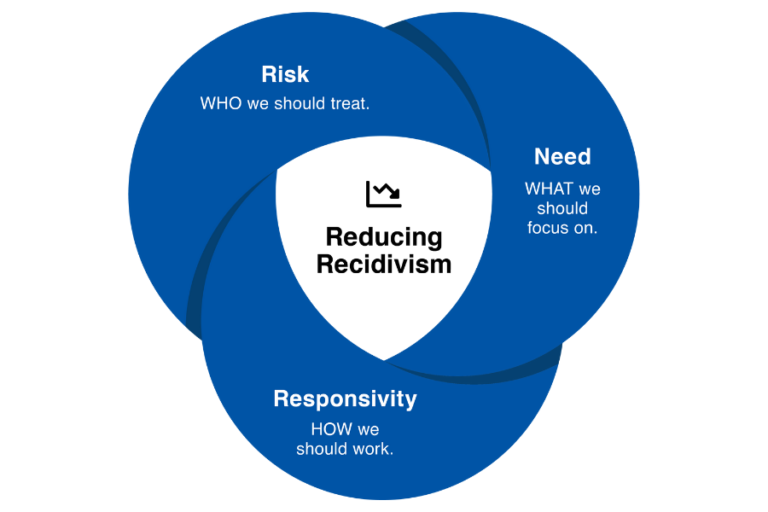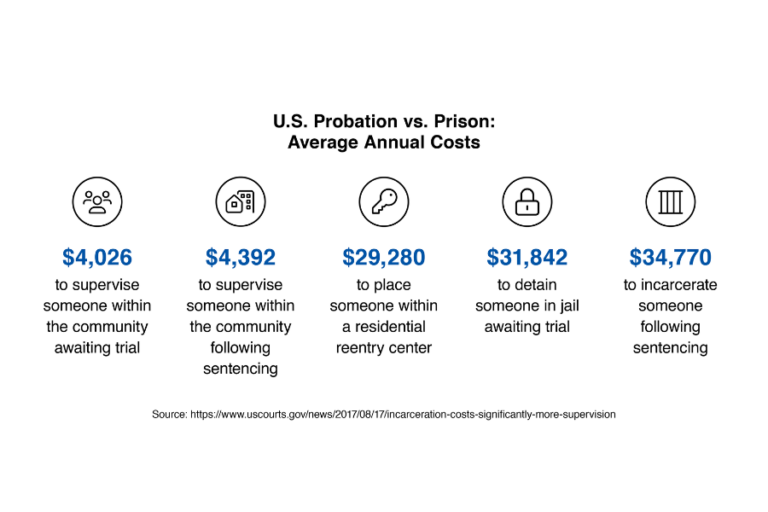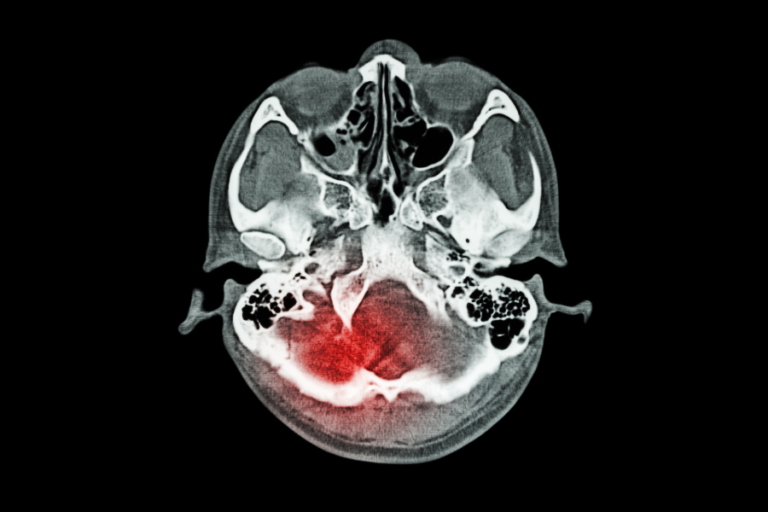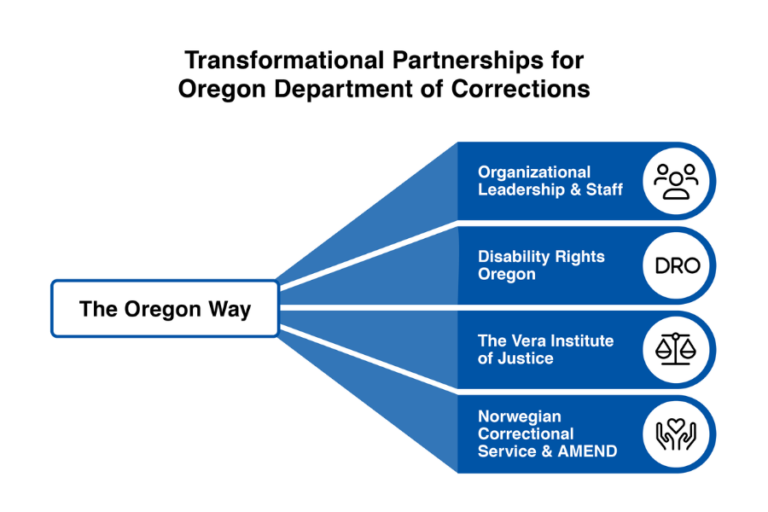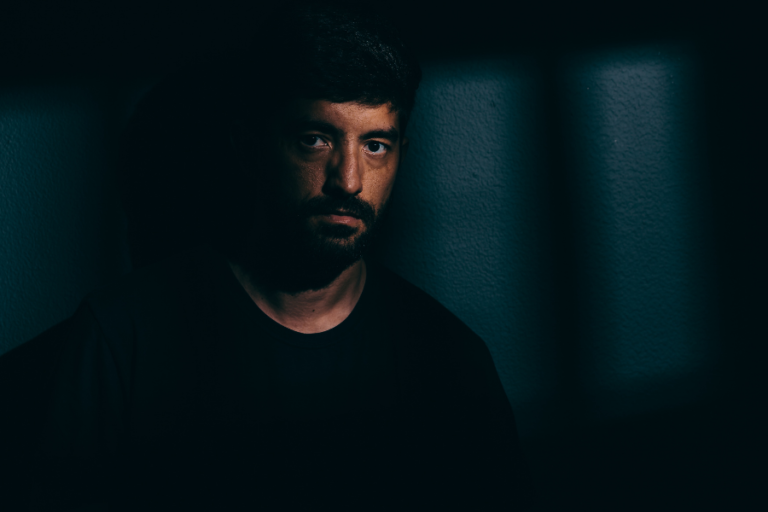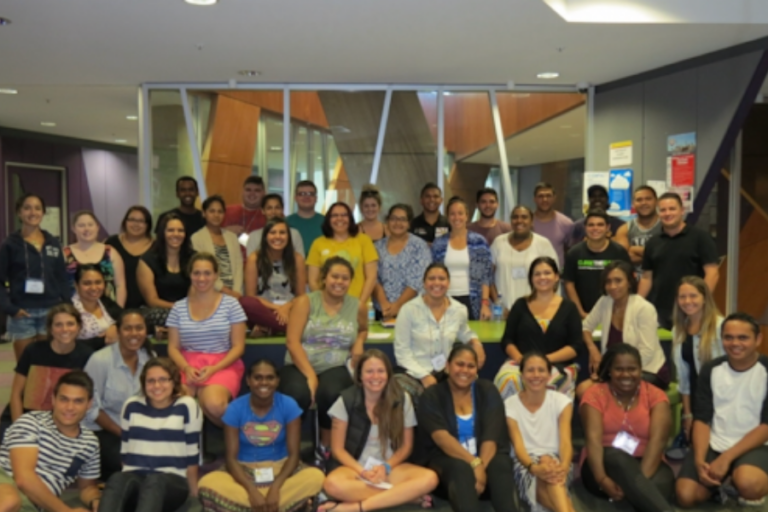This practice commentary continues the first installment published in the October 2021 IACFP Bulletin. This two-part series was launched with an all-important question related to reducing recidivism: “What matters for outcomes?” A multitude of correctional research was reviewed, which has established that outcomes are impacted by both technical and relational aspects.Technical aspects cover the treatment approach used (what you do), yet relational aspects cover the provider’s delivery of those treatment elements (how you do it). A frustration was shared that early work on evidence-based practices focused almost entirely on the technical procedures and methods, while the relationship between … [Read more...] about Adding Relational to Technical Factors for Reducing Recidivism: Provider Effects and Relational Factors Impacting Outcomes (Part 2)
Prison vs. Probation…Which Is More Effective?
This month, Frank J. Porporino, Ph.D., shares highlights from responses he prepared to interview questions focusing on the efficacy of prison vs. probation. Question 1 In one of your keynote speeches to the World Congress on Probation, you argued that reliance on incarceration is cost-ineffective and that probation can lower the cost of criminal justice. Can you share some of the data on this? What are the economic and cost-efficiency benefits of probation sanctions instead of custodial sanctions?FP: If we look at just basic cost estimates of imprisonment vs. probation … it’s like comparing the size of a grapefruit vs. a grape … in the U.S., for example, the cost of incarcerating … [Read more...] about Prison vs. Probation…Which Is More Effective?
Research Summary: TBI’s Impact on Risk of Recidivism in Community Corrections
At the end of 2018, the United States had 4.5 million people in community corrections, which was more than double the number of incarcerated individuals in both jails and prisons. While past research has indicated that over 50% of men incarcerated in jails have experienced at least one traumatic brain injury (TBI); however, very little research has looked at the prevalence of TBI in community corrections (e.g., probation and parole). This article summarizes research recently published in the December 2021 issue of Criminal Justice and Behavior, which examines the impact of TBI on the risk of recidivism in community corrections, as well as accommodations that may improve receptivity and … [Read more...] about Research Summary: TBI’s Impact on Risk of Recidivism in Community Corrections
Research and Resources for Jan/Feb 2022
We've compiled top highlights from recent news, research, and resources across the world for our latest IACFP International News summary. Our topics for January and February, 2022 include: IACFP updates, emerging research, policy updates, practice highlights, and upcoming conferences. 1. IACFP Updates New Editor-in-Chief for Criminal Justice and BehaviorThe IACFP Board is pleased to announce that they recently selected Mark Olver, Ph.D., as the editor-in-chief of Criminal Justice and Behavior, effective January 1, 2022. Dr. Olver has been an associate editor for CJB the last four years. He is a registered doctoral psychologist with the Saskatchewan College of Psychologists and a … [Read more...] about Research and Resources for Jan/Feb 2022
Brookings Institute Report Summary: Recommended Reforms to Improve Prisoner Reentry
A new report from the Brookings-AEI Working Group on Criminal Justice Reform was published this year as part of its series: "A Better Path Forward for Criminal Justice." The seventh chapter of the series focuses on how to improve prisoner reentry for the over 640,000 people per year who return to their communities following incarceration. In this article, we provide a summary of their findings, including short- and long-term recommendations to increase racial equity and improve the reentry process. The Need for Criminal Justice Reform The report frames prisoner reentry as a racial justice issue that merits a criminal justice reform response. Black Americans are anywhere from five to … [Read more...] about Brookings Institute Report Summary: Recommended Reforms to Improve Prisoner Reentry
The Oregon Way: Responding to Mental Illness in Corrections
The last issue of the IACFP Bulletin included a summary of recent research examining the relationship between solitary confinement and mental illness of adults in corrections. Readers were invited to answer four questions about their experiences, from the perspective of practitioners. Those questions were:Have you changed your policy on placing incarcerated persons in isolation cells over the last five years?Are you aware of criminal justice systems that have either not allowed mentally ill persons to be placed in isolation cells or that place an upper limit on their time in this type of confinement?As a practitioner, how do you assess an incarcerated person’s functional impairment? How do … [Read more...] about The Oregon Way: Responding to Mental Illness in Corrections
The Genetic Factor: Understanding No Remorse
The headline was stark: “Black Twitter Reacts: Derek Chauvin, Sentenced to 22.5 Years in Prison, Offers No Remorse to George Floyd’s Family” (Clark, 2021). Prompting the very important question: How do we understand no remorse in the wake of national outrage or tragedy—particularly from a criminal justice context?On November 15, 2021, in his closing prosecutorial arguments, Thomas Binger, Kenosha Wisconsin’s Assistant District Attorney, referred to Kyle Rittenhouse as showing “no remorse” for what he had done (CNN), suggesting that if Mr. Rittenhouse was able to feel remorseful, he would have behaved differently and not killed or wounded those he did. What Is Remorse? The word … [Read more...] about The Genetic Factor: Understanding No Remorse
IACFP International News, Research, and Resources for Nov/Dec 2021
We've compiled top highlights from recent news, research, and resources across the world for our latest IACFP International News summary. Our topics for November and December include emerging research, policy updates, and practice highlights. 1. Research Criminological Highlights, Volume 19, Number 5, September 2021 You can view the September 2021 issue of Criminological Highlights here. This issue of Criminological Highlights addresses the following questions: When police speak to Black and White citizens, how do they communicate different messages even if the words are the same? Can you predict how youths will be processed by the criminal justice system by looking at … [Read more...] about IACFP International News, Research, and Resources for Nov/Dec 2021
Adding Relational to Technical Factors for Reducing Recidivism: Following the Research to Improve Outcomes (Part 1)
Looking back just over two decades, criminal justice suffered from a lack of proven methods for reducing recidivism for formerly incarcerated individuals (Andrews & Bonta, 2003). Today, it is almost unimaginable that the field ever operated without practice methods that were studied and empirically validated through rigorous science. Science-based methods for offender work have been propelled by multiple streams of interest, united by evidence-based practices (EBP). This article examines relational and technical factors examined in prior research linked to reducing recidivism and improving outcomes in corrections. Evidence over Ideology Corrections has taken a positive turn. … [Read more...] about Adding Relational to Technical Factors for Reducing Recidivism: Following the Research to Improve Outcomes (Part 1)
New Research Examines the Relationship Between Solitary Confinement and Mental Illness
Solitary confinement has long been an area of controversy within the context of criminal justice and corrections. Those against the practice have questioned whether it is ethical due to the potential psychological impact it can have on incarcerated individuals. For incarcerated persons with mental illness (IPMI), this impact can be even greater; particularly if IPMI are more likely to receive solitary confinement. This article summarizes a recent study, originally published in Justice Quarterly, conducted by researchers at Florida State University that examines the relationship between solitary confinement and mental illness to determine if IPMI have an increased likelihood of being sent to … [Read more...] about New Research Examines the Relationship Between Solitary Confinement and Mental Illness
The Relationship Between Justice System Involvement and the Social and Emotional Wellbeing (SEWB) of Aboriginal and Torres Strait Islander Youth
It is well established throughout the literature that there is a relationship between poor mental health and engagement with the justice system. However, narrow Western definitions of mental health do not align with Aboriginal perspectives of health and wellbeing which endorse a more holistic approach to their conceptualisation. Social and emotional wellbeing (SEWB) is a more culturally appropriate term that better describes Aboriginal perspectives of health and connectedness. SEWB can be thought of as the individual's and the collective’s connection to body, mind, land, family, culture, and spirituality. Thus, the study discussed in this article aims to determine the relationship between … [Read more...] about The Relationship Between Justice System Involvement and the Social and Emotional Wellbeing (SEWB) of Aboriginal and Torres Strait Islander Youth
Capturing Change: Validation of the Client Change Scale with the Correctional Service of Canada Community—A M.A. Thesis Summary
Consistent with the crime-desistance literature findings that people change and that a goal of the criminal justice system is rehabilitation, it would seem imperative that a reliable and accurate measure of such change be available. However, there are currently very few measures that accurately measure justice-involved person change in correctional settings (Serin et al., 2013). For this reason, the purpose of this research was to validate a new measure of change, known as the Client Change Scale (CCS; Serin & Lloyd, 2018), which is a risk-relevant, desistance-oriented measure of change based on the Transition Model of Offender Change (Serin & Lloyd, 2009). Client Change Scale … [Read more...] about Capturing Change: Validation of the Client Change Scale with the Correctional Service of Canada Community—A M.A. Thesis Summary


